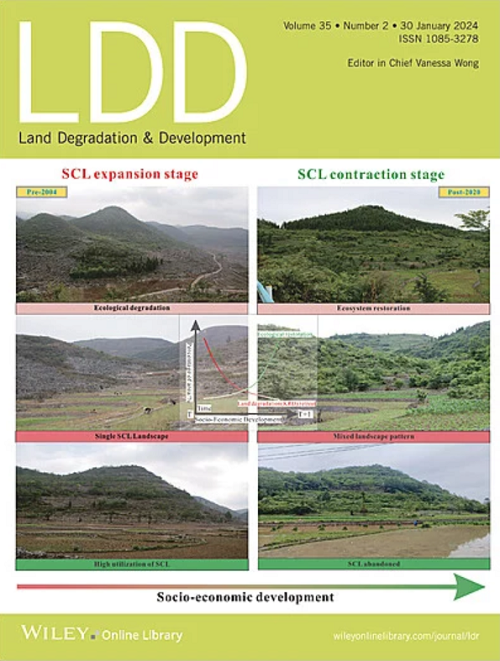通过植物多样性恢复土壤健康:套种八爪草可提高芒果园土壤功能和微生物多样性
IF 3.7
2区 农林科学
Q2 ENVIRONMENTAL SCIENCES
引用次数: 0
摘要
芒果的单一栽培依赖于化肥和农药,导致了严重的土壤退化和水污染。作为一种可持续发展的替代方案,多种植物混合种植可以改善土壤健康,减轻单一栽培对环境的影响。本研究在芒果树园内种植了一种本地药用植物“八爪草”,以评估其对土壤性质、酶活性和微生物群落的影响。套种7年后,收集了5个处理的土壤样品:CK(单芒果)、CKM(对照处理中位数)、M(芒果+舍弗勒)、SOV(八叶舍弗勒根际)和TM(混交林中位数)。结果表明,与单独种植芒果(CK)相比,套种雪夫勒显著改善了土壤性质,土壤水分、速效钾、有机碳、铵态氮和硝态氮分别提高了52%、14%、51%、20%和90%。此外,与芒果单一栽培系统的基线值相比,套种八爪草显著提高了土壤酶的活性,包括过氧化氢酶(30%-50%)、酸性磷酸酶(8%-12%)、蔗糖酶(7%-28%)和脲酶活性(6%-22%)(p <;0.05)。混交林提高了物种丰富度和丰度(p <;微生物组Shannon指数和Chao指数0.05)。主成分分析(PCA)显示了不同处理间微生物群落的显著变化,并通过层次聚类和网络分析进一步验证了这一结果。Spearman相关分析揭示了微生物组成与土壤性质在细菌和真菌水平上的显著关系。冗余分析(RDA)表明,在物种水平上,土壤化学生化特性与细菌和真菌群落呈正相关。研究结果表明,在芒果果园内套种章鱼舍弗勒可以显著改善土壤健康和微生物群落,为解决芒果单作带来的生态挑战提供了一种有前景的可持续方法。未来的研究建议探索其在不同土壤类型和气候条件下的适用性,以支持其更广泛的适应性。本文章由计算机程序翻译,如有差异,请以英文原文为准。
Restoring Soil Health Through Plant Diversity: Interplanting Schefflera octophylla Enhances Soil Function and Microbial Diversity in Mango Orchards
Mango monoculture cultivation, reliant on chemical fertilizers and pesticides, has led to significant soil degradation and water contamination. As a sustainable alternative, mixed plantations involving diverse plant species have been suggested to improve soil health and mitigate the environmental impacts of monoculture. In this study, we interplanted a native medicinal plant “Schefflera octophylla ” in a mango orchard to evaluate its impacts on soil properties, enzyme activities, and microbial communities. After 7 years of interplanting, soil samples were collected from five treatments: CK (sole mango), CKM (median of the control treatment), M (Mango + Schefflera) , SOV (Schefflera octophylla rhizosphere) and TM (Median of the mix plantation). Results showed that interplanting with Schefflera octophylla significantly enhanced soil properties, increasing soil moisture, available potassium, organic carbon, ammonium nitrogen, and nitrate nitrogen by 52%, 14%, 51%, 20%, and 90%, respectively, compared to sole mango cultivation (CK). Furthermore, interplanting with Schefflera octophylla significantly improved the activities of soil enzymes, including catalase (30%–50%), acid phosphatase (8%–12%), sucrase (7%–28%) and urease activity (6%–22%) compared to the baseline values in the mango monoculture system (p < 0.05). The mixed plantation enhanced both the species richness and abundance (p < 0.05) based on the Shannon and Chao indices of microbiome. Furthermore, the principle component analysis (PCA) showed significant microbial community shifts among the treatments, further validated by hierarchical clustering and network analysis. Spearman correlation analysis revealed significant relationships between microbial composition and soil properties at both the bacterial and fungal levels. Redundancy analysis (RDA) showed a positive relationship between soil chemical and biochemical properties and the bacterial and fungal communities at the species level. These findings demonstrate that interplanting Schefflera octophylla in mango orchards can significantly enhance soil health and microbial communities, offering a promising and sustainable approach to address the ecological challenges associated with mango monoculture. Future studies are recommended to explore its applicability across various soil types and climatic conditions to support its broader adaptation.
求助全文
通过发布文献求助,成功后即可免费获取论文全文。
去求助
来源期刊

Land Degradation & Development
农林科学-环境科学
CiteScore
7.70
自引率
8.50%
发文量
379
审稿时长
5.5 months
期刊介绍:
Land Degradation & Development is an international journal which seeks to promote rational study of the recognition, monitoring, control and rehabilitation of degradation in terrestrial environments. The journal focuses on:
- what land degradation is;
- what causes land degradation;
- the impacts of land degradation
- the scale of land degradation;
- the history, current status or future trends of land degradation;
- avoidance, mitigation and control of land degradation;
- remedial actions to rehabilitate or restore degraded land;
- sustainable land management.
 求助内容:
求助内容: 应助结果提醒方式:
应助结果提醒方式:


